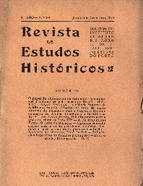

................................
Another interesting historiographical debate is highlighted in the article by António Mendes Correia, entitled A lealdade de uma Rainha portuguesa (The loyalty of a Portuguese queen). In it, the author argues that Queen Catherine of Austria never favoured the aspirations of Charles V and Philip II to the Portuguese crown, contrary to the opinions defended by Professor Queiroz Veloso, of the University of Lisbon, and by José de Sousa Guimarães. To this end, Mendes Correia bases his argument on the monograph by Spanish academic Llanos y Torriglia and on unpublished documents published by Queiroz Veloso. José de Sousa Guimarães would publish a book entitled Erros da História (Errors of History), in which he would attack Mendes Correia’s position on the role of this queen in the establishment of the Dual Monarchy. The professor at the Faculdade de Letras do Porto [School of Arts and Humanities of Porto] criticises the high degree of “inflexible historical certainty” demonstrated by his interlocutor, analysing the very concept of “historical error” incorporated in the work. He criticises the “judgement of historical figures” carried out, as well as the author’s partial and severe language. In the article in question, Mendes Correia took the opportunity to defend his point of view, implicitly and explicitly criticising his opponents, in a debate that was understandable during a period when historical nationalism was a historiographical trend, emphasising a taste for the biographies of great historical figures.
While, on the one hand, this publication offers a broader historical perspective in comparison with contemporary international scenarios, on the other hand, there are also references to regional history. This is the case ly in the article by Artur de Magalhães Basto entitled O Porto contra Junot (Porto against Junot), which recounts the opposition of the people of Porto to the invasion by French troops. The author’s discourse is sometimes reduced to a theatrical succession of events, due to the excessive use of adjectives in a markedly factual text. This cult of narrative history is also evident in another article by the same author, entitled Na morte de um Rei (On the Death of a King), which recounts in detail the funeral of Dom Pedro II. Magalhães Basto expresses enthusiasm when the ‘patriots of Porto’ rise up against the invading French troops. The notion of ‘homeland’ is recurrent in his discourse, referring to ‘patriotism’, the ‘patriotic aspirations’ of the people of Porto or the Portuguese ‘homeland’. The people of Porto are observed in many different ways by the author. They are the “masses” who incite revolt against the “Jacobins”; they are the “people” who, frightened, do not understand the “invasion”. But the people of Porto are also a “population,” a “multitude,” “mobs” that incite “revolt,” a “rabble,” “plebs,” which contrasts with the “upper classes,” the latter with little enthusiasm for the struggle.
This work is financed by national funds through FCT - Foundation for Science and Technology, I.P, in the scope of the projects UIDB/04311/2020 and UIDP/04311/2020.
